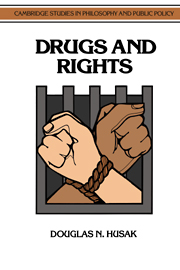1 - Drugs, drug use, and criminalization
Published online by Cambridge University Press: 05 June 2012
Summary
THE WAR ON DRUGS
For a period of sixteen months from 1989-1990, a majority of Americans identified drugs as our nation's greatest concern, surpassing crime, the environment, taxes, the homeless, education, and the deficit. War in the Middle East temporarily focused attention elsewhere. But President George Bush promised to restore the problem to its “number one” status “when the international situation has calmed down.” According to William Bennett, America's first “drug czar,” “drugs remain ... our gravest domestic problem.”
So great is the problem perceived to be that the public has enthusiastically responded to the latest call for a “war on drugs.” This declaration of war is not new. The military metaphor has dominated thought about drug policy ever since Richard Nixon became the first president to declare war on drugs.
The war metaphor is, of course, an exaggeration; the resources mobilized against drugs are not comparable to efforts during wartime. The costs of enforcing criminal laws against the recreational use of drugs (henceforth shortened to “laws against drugs,” or LAD) are modest by comparison to our military budget, even when we are officially at peace. Still, by any measure, a massive effort is under way to attempt to eliminate illegal drug use in our society. This effort is built on a broad, if not an especially deep, social consensus.
- Type
- Chapter
- Information
- Drugs and Rights , pp. 9 - 70Publisher: Cambridge University PressPrint publication year: 1992
- 1
- Cited by



